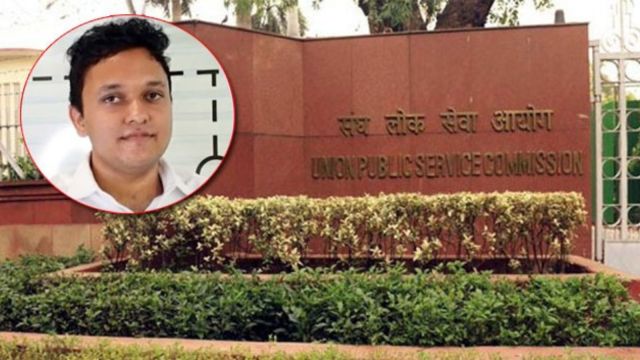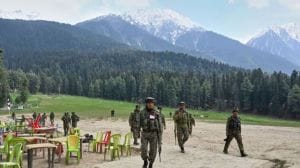The Union Public Service Commission (UPSC) on April 16 declared the Civil Services 2023 exam results, in which PK Sidharth Ramkumar achieved an All India Rank (AIR) 4.
A graduate in Architecture from the University of Kerala, he is undergoing training at IPS Academy in Hyderabad. His father is retired, his mother a homemaker and his elder brother is a practising lawyer in Kerala High Court.

While the family and Sidharth always believed in his capabilities, the Kerala boy was not expecting such a high rank. Some excerpts from his interview:
Were you expecting a top rank?
Initially, my expectations were conservative, anticipating a rank within a certain range. Securing AIR 4 came as a surprise, exceeding my initial expectations. However, my commitment to diligent preparation and unwavering focus played a pivotal role in achieving this remarkable feat.
Moreover, the journey towards securing a top rank was characterised by perseverance, resilience, and continuous self-improvement. In this attempt, I was focused on improving my mains. I focused on improving my notes and value addition. However, to be true I was not expecting the rank I got.
What made you choose UPSC?
My decision to pursue the UPSC examination stemmed from a deep-rooted aspiration to serve my nation. The diverse opportunities and scope offered by the Indian Administrative Service (IAS) resonated with my academic background in architecture and planning. The potential to contribute to policy-making, governance, and societal development motivated me to embark on this challenging yet fulfilling journey.
Furthermore, my exposure to various socio-economic issues during my academic pursuits and professional experiences ignited a sense of responsibility to address these challenges at a systemic level. The UPSC examination presented itself as a gateway to effecting positive change on a broader scale, allowing me to channel my passion for public service into tangible actions that could benefit society as a whole.
Story continues below this ad
How did your degree in Architecture help you in UPSC?
Graduating in architecture built a strong analytical foundation and a holistic understanding of urban planning and development. This academic background proved advantageous in comprehending certain aspects of governance, particularly in areas related to infrastructure, urban management, and public policy. Additionally, it instilled in me a disciplined approach to problem-solving and critical thinking, which were invaluable assets during the UPSC preparation journey.
Moreover, the background in my home was also very suitable for civil services preparation. My brother is a lawyer, practising in the Kerala High Court and my father also keeps discussing public issues. This too helped me to have an orientation towards civil services.
My academic endeavours fostered a sense of intellectual curiosity and a commitment to lifelong learning, qualities that served me well in navigating the vast and multifaceted syllabus of the UPSC examination.
How was your UPSC interview round?
Story continues below this ad
The UPSC interview round was both challenging and enriching. While it was difficult to pinpoint a single moment that assured my success, I felt confident in articulating my thoughts coherently and substantiating my responses with clarity and conviction. One of the most interesting questions I was asked in the interview was to name 10 women who have motivated me the most. I gave many examples of famous civil servants like Aruna Soundarajan, one of the faculty members at SVNPA and my mother.
The interview provided a platform for me to showcase not only my knowledge and expertise but also my interpersonal skills, emotional intelligence, and leadership qualities. On the whole, I was satisfied with the interview.
This was your fifth attempt at UPSC Civil Services, what changes did you make in your preparation strategy this time?
Reflecting on my previous attempts, I identified areas for improvement and fine-tuned my preparation strategy accordingly. I focused on enhancing answer writing skills, staying updated with current affairs, and adopting a more nuanced approach to optional subjects. While there was a lingering apprehension about the outcome, I remained resilient and committed to giving my best.
Story continues below this ad
To stay informed and prepared, I rely on a variety of sources. Initially, I followed DNS on YouTube through Rau’s IAS Study Circle for current affairs updates. Additionally, I used their magazines, as well as those from other sources, to keep abreast of relevant news and events.
Recently, I have shifted towards reading newspapers like The Indian Express and The Hindu, finding them to offer comprehensive coverage of political, judicial, and societal issues essential for UPSC preparation. Their in-depth analysis and coverage, especially on the Explained Page by The Indian Express, have proven beneficial in enhancing my current affairs and governance.
What are your plans now? Which key areas are you looking forward to in your service?
As I embark on this new chapter in my career, I am eager to immerse myself in diverse challenges and opportunities offered by the civil services. My overarching goal is to serve with integrity, empathy, and effectiveness, contributing towards inclusive governance, sustainable development, and social welfare. I am particularly keen on exploring avenues for leveraging technology and innovation to enhance service delivery, promote transparency, and empower marginalised communities.
Story continues below this ad
I aspire to play a proactive role in addressing pressing societal issues such as poverty alleviation, environmental conservation, and gender equality. By fostering collaboration with stakeholders, facilitating participatory decision-making processes, and championing evidence-based policy interventions, I aim to make a tangible difference in the lives of citizens and contribute towards building a more equitable and prosperous society.
What is your advice to students appearing for UPSC Civil Services Prelims next month?
To aspiring UPSC candidates, I would emphasise the importance of perseverance, resilience, and strategic preparation. Cultivate a deep understanding of socio-political issues, stay abreast of current affairs, and hone critical thinking and analytical skills. Maintain a balanced approach, prioritise self-care, and seek guidance from mentors and peers. Remember that success in the UPSC exam requires not only academic proficiency but also integrity, ethical conduct, and a genuine passion for public service.
Additionally, I would encourage aspirants to cultivate a growth mindset, embrace failure as a stepping stone to success, and remain adaptable in the face of challenges. Approach the preparation process with dedication and discipline, but also maintain a sense of perspective and humility.
Story continues below this ad
Ultimately, the UPSC journey is not just about clearing an exam; it is about embracing a noble calling to serve the nation and make a positive impact on the lives of millions.

































